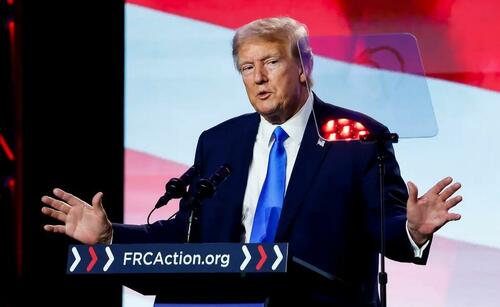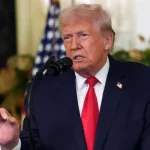
Authored by Catherine Yang via The Epoch Times (emphasis ours),
President Trump gave some background on how the decision to challenge the 2020 elections came about.

Former President Donald Trump received advice from many different people after the 2020 elections, and after weighing various opinions, as well as his own thoughts about it, he ultimately decided to formally challenge the results.
In an interview with NBC’s “Meet the Press” host Kristen Welker, he spoke about what went into the decision.
"I was listening to different people. And when I added it all up, the election was rigged," he said. "It was my decision."
The two discussed the four criminal indictments against President Trump, including the one in Washington that alleges his actions in challenging the election went too far, tying the charges to the events of Jan. 6, 2021.
Ms. Welker asked why he decided to challenge the elections even after "the most senior lawyers in your own administration and on your campaign" told him he lost.
"I didn't respect them as lawyers," he said, adding that former Attorney General Bill Barr had allegedly been afraid of an impeachment inquiry and acted to avoid that, and many others he had hired based on recommendations. "But I did respect others."
"It's my choice," he added. "I happen to know that the election was rigged," he said, referring to evidence he had initially planned to release after the Georgia indictment of him, also for challenging the election results. On the advice of his current legal counsel, the evidence will be a part of his defense in upcoming trials instead.
Ms. Welker asked if the 45th president, who is far ahead of other GOP candidates running for office in 2024, whether he believed he lost the 2020 elections.
"I say I won the election," he clarified.
"Even though, again, your lawyers told you you did not," she said.
"Some people told me that. But many people told me the opposite," he responded, leading her to question why he listened to "outside lawyers" who "had crazy theories."
"Were you listening to them because they were telling you what you wanted to hear?" she asked.
"You know who I listen to? Myself. I saw what happened. I watched that election, and I thought the election was over at 10 o'clock in the evening," he said.
"It was my decision," he said.
January 6
The former president clarified his role of Jan. 6, 2021, as well.
Special counsel Jack Smith is now prosecuting the Washington case against President Trump, alleging conspiracy to obstruct an official proceeding, obstructing an official proceeding, conspiracy to defraud the United States, and conspiracy against rights. They relate to Jan. 6 only in terms of his calls to delay the vote certification in Congress on that day.
"First of all, I had very little to do with January 6th," he said, referring to the Capitol breach. "I was asked to speak, and I was the President of the United States. I'm allowed to do that."
He said that "hundreds of thousands of people were there, and it was a beautiful, beautiful sight," and that he spoke "peacefully and patriotically" at the event. He told Ms. Welker he had thought about going into the Capitol that day, but Secret Service advised him to go back to the White House.
"I wanted to go down peacefully and patriotically to the Capitol. Secret Service, who I have great respect for, said, 'Sir, it’s better if you don’t do that. It could be unsafe,'" President Trump said. He clarified they didn't mean they anticipated a riot, but because with such a large crowd, a single assailant would have significant cover. "So I didn't have a dispute with them."
He further alleged that the breach happened because then-Speaker Nancy Pelosi (D-Calif.) turned down his offer of 10,000 additional National Guard. "She's responsible for January 6th," he alleged. "And the J6 Committee refused to interview her."
He noted that the treatment of those who were present was one reason he decided to run for reelection.
"People that went [there], that didn't even go into the building, have suffered gravely," he said, pointing out that rioters in cities across the country calling to "defund the police" were not prosecuted in the same way. The Department of Justice has thus far brought 1,100 cases against those who were present on Jan. 6, and efforts continue.
"When you launched your campaign in March, you told the crowd, quote, 'I am your retribution.' What does that mean? What does that look like?" Ms. Welker asked President Trump.
"I think retribution is talking in terms of I have to protect people," he said. "What they're doing to people is so horrible. They're putting people in jail for long periods of time. Firemen, policemen, accountants, even lawyers. They're in prisons for years now and don't even have trials in some cases."
"I'm talking about fairness," he said, adding he was open to pardoning those who were wrongly imprisoned, and dismissing rumors that he planned to fire or target his political opponents. "I'm looking to appoint an attorney general who's going to be tough on crime and fair. Very simple."
President Trump gave some background on how the decision to challenge the 2020 elections came about.
Former President Donald Trump received advice from many different people after the 2020 elections, and after weighing various opinions, as well as his own thoughts about it, he ultimately decided to formally challenge the results.
In an interview with NBC’s “Meet the Press” host Kristen Welker, he spoke about what went into the decision.
“I was listening to different people. And when I added it all up, the election was rigged,” he said. “It was my decision.”
The two discussed the four criminal indictments against President Trump, including the one in Washington that alleges his actions in challenging the election went too far, tying the charges to the events of Jan. 6, 2021.
Ms. Welker asked why he decided to challenge the elections even after “the most senior lawyers in your own administration and on your campaign” told him he lost.
“I didn’t respect them as lawyers,” he said, adding that former Attorney General Bill Barr had allegedly been afraid of an impeachment inquiry and acted to avoid that, and many others he had hired based on recommendations. “But I did respect others.”
“It’s my choice,” he added. “I happen to know that the election was rigged,” he said, referring to evidence he had initially planned to release after the Georgia indictment of him, also for challenging the election results. On the advice of his current legal counsel, the evidence will be a part of his defense in upcoming trials instead.
Ms. Welker asked if the 45th president, who is far ahead of other GOP candidates running for office in 2024, whether he believed he lost the 2020 elections.
“I say I won the election,” he clarified.
“Even though, again, your lawyers told you you did not,” she said.
“Some people told me that. But many people told me the opposite,” he responded, leading her to question why he listened to “outside lawyers” who “had crazy theories.”
“Were you listening to them because they were telling you what you wanted to hear?” she asked.
“You know who I listen to? Myself. I saw what happened. I watched that election, and I thought the election was over at 10 o’clock in the evening,” he said.
“It was my decision,” he said.
January 6
The former president clarified his role of Jan. 6, 2021, as well.
Special counsel Jack Smith is now prosecuting the Washington case against President Trump, alleging conspiracy to obstruct an official proceeding, obstructing an official proceeding, conspiracy to defraud the United States, and conspiracy against rights. They relate to Jan. 6 only in terms of his calls to delay the vote certification in Congress on that day.
“First of all, I had very little to do with January 6th,” he said, referring to the Capitol breach. “I was asked to speak, and I was the President of the United States. I’m allowed to do that.“
He said that “hundreds of thousands of people were there, and it was a beautiful, beautiful sight,” and that he spoke “peacefully and patriotically” at the event. He told Ms. Welker he had thought about going into the Capitol that day, but Secret Service advised him to go back to the White House.
“I wanted to go down peacefully and patriotically to the Capitol. Secret Service, who I have great respect for, said, ‘Sir, it’s better if you don’t do that. It could be unsafe,'” President Trump said. He clarified they didn’t mean they anticipated a riot, but because with such a large crowd, a single assailant would have significant cover. “So I didn’t have a dispute with them.”
He further alleged that the breach happened because then-Speaker Nancy Pelosi (D-Calif.) turned down his offer of 10,000 additional National Guard. “She’s responsible for January 6th,” he alleged. “And the J6 Committee refused to interview her.”
He noted that the treatment of those who were present was one reason he decided to run for reelection.
“People that went [there], that didn’t even go into the building, have suffered gravely,” he said, pointing out that rioters in cities across the country calling to “defund the police” were not prosecuted in the same way. The Department of Justice has thus far brought 1,100 cases against those who were present on Jan. 6, and efforts continue.
“When you launched your campaign in March, you told the crowd, quote, ‘I am your retribution.’ What does that mean? What does that look like?” Ms. Welker asked President Trump.
“I think retribution is talking in terms of I have to protect people,” he said. “What they’re doing to people is so horrible. They’re putting people in jail for long periods of time. Firemen, policemen, accountants, even lawyers. They’re in prisons for years now and don’t even have trials in some cases.”
“I’m talking about fairness,” he said, adding he was open to pardoning those who were wrongly imprisoned, and dismissing rumors that he planned to fire or target his political opponents. “I’m looking to appoint an attorney general who’s going to be tough on crime and fair. Very simple.”






